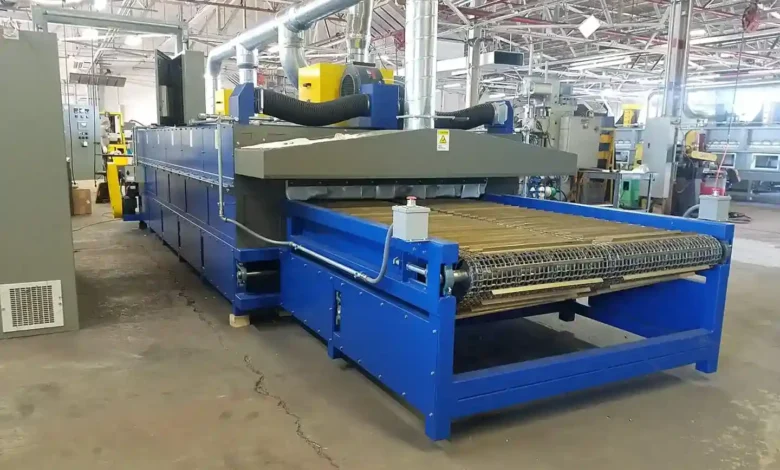
Conveyor ovens have become a universal fixture in various industries, revolutionizing the way we cook, bake, and manufacture a wide range of products. From fast-food restaurants and pizzerias to industrial manufacturing plants, conveyor ovens play a pivotal role in streamlining processes and ensuring consistent product quality.
1. Market Overview
The global conveyor oven market size has witnessed significant growth over the years, driven by the demand for efficient and automated cooking and manufacturing processes. Key factors contributing to the market’s expansion include:
- Rise in Fast-Food Chains: The proliferation of fast-food chains worldwide has fueled the demand for conveyor ovens. These ovens enable quick and consistent cooking, enhancing the efficiency of fast-food establishments.
- Industrial Manufacturing: Conveyor ovens are extensively used in industrial settings for processes such as curing, drying, and baking. Industries like automotive, electronics, and textiles rely on these ovens for efficient production.
- Technological Advancements: Continuous innovation in conveyor oven technology has led to improved energy efficiency, temperature control, and automation, making them more attractive for various applications.
- Food Processing: Conveyor ovens find extensive use in the food processing industry for baking, roasting, and drying processes. This versatility has driven their adoption in commercial kitchens and food production facilities.
2. Market Segmentation
To gain a deeper understanding of the conveyor oven market, it is essential to explore its segmentation:
a. Type of Conveyor Ovens:
- Tunnel Ovens
- Chain Convection Ovens
- Flat Belt Ovens
- Mesh Belt Ovens
- Overhead Conveyors
b. End-Use Industries:
- Food and Beverage
- Electronics
- Automotive
- Textiles
- Others
c. Heat Source:
- Electric Conveyor Ovens
- Gas Conveyor Ovens
d. Geography:
- North America
- Europe
- Asia-Pacific
- Latin America
- Middle East and Africa
3. Technological Advancements
The conveyor oven industry has undergone significant technological advancements, leading to improved performance, energy efficiency, and automation. Some notable innovations include:
- Digital Temperature Control: Modern conveyor ovens are equipped with digital temperature control systems, ensuring precise and consistent cooking or manufacturing temperatures.
- Energy-Efficient Designs: Manufacturers are focusing on energy-efficient conveyor oven designs, utilizing advanced insulation materials and optimized heating elements to reduce energy consumption.
- Conveyor Belt Materials: The choice of conveyor belt materials has evolved to ensure durability and easy maintenance. Stainless steel and Teflon-coated belts are popular choices.
- Automation: Conveyor ovens are increasingly integrated with automation systems, enabling remote monitoring, recipe management, and real-time adjustments for improved efficiency.
4. Key Players
Several companies dominate the conveyor oven market, offering a wide range of products and services. Some of the prominent players include:
- Middleby Corporation: Known for its innovative cooking equipment, Middleby Corporation offers a variety of conveyor ovens for commercial and industrial use.
- Lincoln Impinger: A subsidiary of Middleby, Lincoln Impinger specializes in conveyor ovens for the food service industry, particularly renowned for its pizza ovens.
- Davron Technologies: Davron Technologies focuses on custom conveyor oven solutions for industrial applications, offering tailor-made solutions to meet specific manufacturing needs.
- TurboChef Technologies: TurboChef Technologies is known for its rapid cook ovens and conveyor ovens, designed for commercial kitchens and food service establishments.
- HIX Corporation: HIX Corporation specializes in industrial and commercial conveyor ovens, including textile curing ovens and custom-designed solutions.
FAQs
Q1: How do conveyor ovens work?
Conveyor ovens operate on a simple principle. They consist of a conveyor belt that moves products through a heated chamber at a consistent speed. The heating elements, located above and below the conveyor belt, generate the required heat for cooking, baking, or manufacturing processes. As products move through the oven, they are exposed to the heat, ensuring even cooking or processing.
Q2: What are the advantages of using conveyor ovens in food service establishments?
Conveyor ovens offer several advantages in food service establishments, including fast and consistent cooking, increased productivity, energy efficiency, and the ability to handle a variety of menu items. They are particularly popular for cooking pizzas, sandwiches, and other fast-food items.
Q3: Are conveyor ovens suitable for industrial applications?
Yes, conveyor ovens are widely used in industrial settings for processes such as drying, curing, and heat treatment. They can handle large volumes of products with consistent results, making them invaluable in industries like automotive, electronics, and textiles.
Q4: What are the key considerations when selecting a conveyor oven for a specific application?
When choosing a conveyor oven, factors to consider include the type of products to be processed, required temperature and cooking time, available space, energy efficiency, and budget constraints. It’s crucial to consult with a conveyor oven specialist to determine the most suitable option for your specific needs.
Q5: Are conveyor ovens energy-efficient?
Modern conveyor ovens are designed with energy efficiency in mind. They often incorporate insulation materials, efficient heating elements, and digital control systems to minimize energy consumption. However, energy efficiency can vary depending on the model and manufacturer, so it’s essential to choose a conveyor oven with energy-saving features.
Q6: Can conveyor ovens be customized for specific applications?
Yes, many conveyor oven manufacturers offer customization options to meet specific application requirements. Customization may include conveyor belt materials, temperature control systems, conveyor speed adjustments, and additional features tailored to your needs.
Q7: How do maintenance and servicing of conveyor ovens work?
Regular maintenance and servicing are essential to ensure the longevity and efficiency of conveyor ovens. Most manufacturers provide maintenance guidelines and offer servicing options. It’s advisable to follow the recommended maintenance schedule and seek professional assistance for any repairs or adjustments.
Q8: Are there safety precautions to consider when using conveyor ovens?
Safety is paramount when operating conveyor ovens. Users should follow all safety guidelines provided by the manufacturer. This includes proper ventilation in commercial kitchens, wearing appropriate protective gear, and ensuring the oven is well-maintained to prevent accidents or malfunctions.
Q9: What is the future outlook for the conveyor oven market?
The conveyor oven market is expected to continue growing, driven by the increasing demand for automation in various industries and the need for energy-efficient cooking and manufacturing solutions. Technological advancements and customization options are likely to further boost market expansion.
Q10: Can conveyor ovens be integrated into smart kitchen systems?
Yes, conveyor ovens are increasingly being integrated into smart kitchen systems. This allows for remote monitoring, temperature control, and recipe management, enhancing efficiency and convenience in commercial kitchens.


